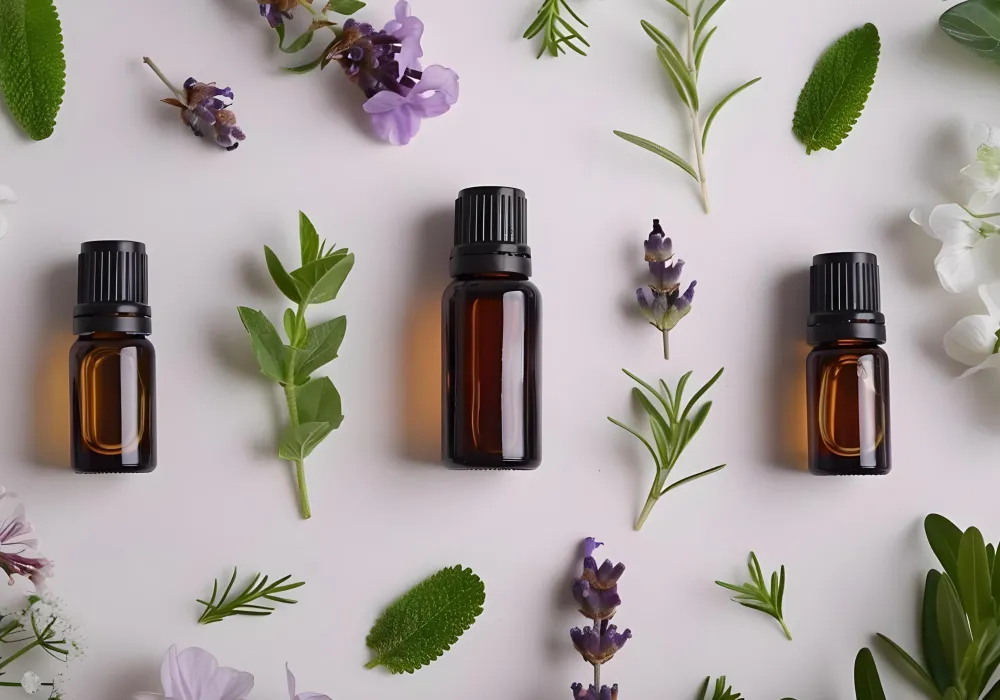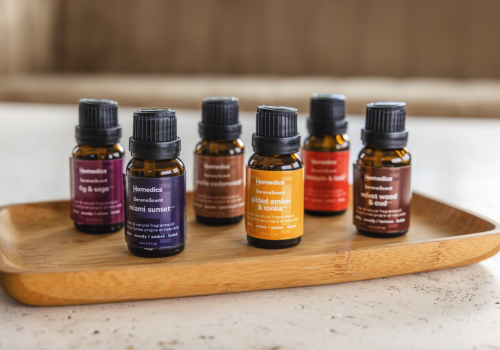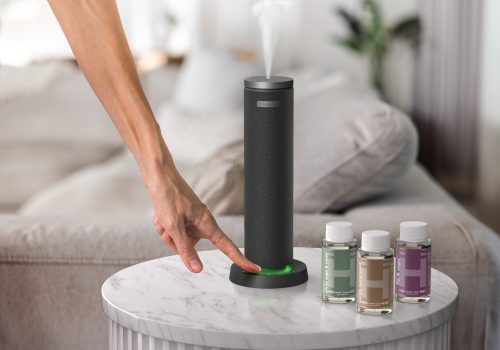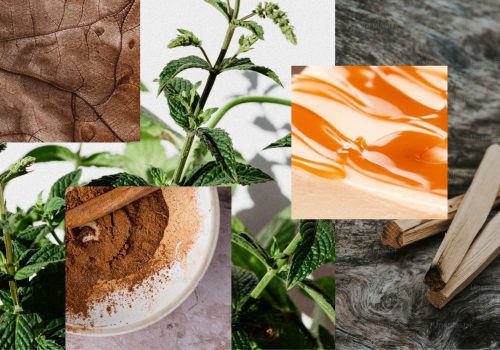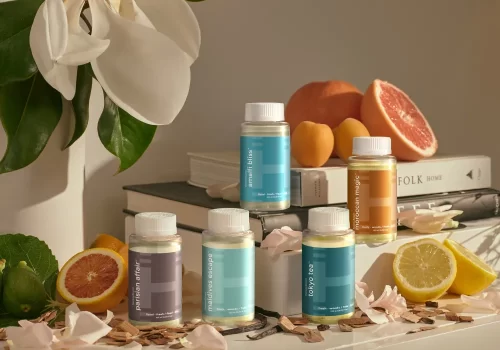Do Essential Oils Work?
What are Essential Oils and Do They Really Work?
For centuries, essential oils have been revered for their captivating aromas and therapeutic properties. These fragrant elixirs — extracted from the leaves, flowers, and other parts of plants — offer a unique and holistic approach to well-being.
But do essential oils work, and if so, how?
Put simply, essential oils don’t “work” on their own, especially if you’re resistant to the idea. To get the most out of these natural extracts, you have to take steps to ensure proper use. Once you do, their positive properties will speak for themselves.
In this guide, we’ll dive into the fascinating world of essential oils, exploring their history, potential benefits, and how to incorporate them into your daily life.
What are Essential Oils?
Essential oils are highly concentrated liquids containing volatile compounds that capture the essence of a plant’s scent and flavor. Also known as phytochemicals, these flower, leaf, seed, bark, and root essences are known for offering a wide range of potential therapeutic benefits.
How exactly are these phytochemicals extracted and bottled for everyday use?
The extraction process of essential oils from plant material can involve one of three methods. These include:
- Steam distillation, in which steam is passed through the plant material to extract the chemical compounds
- Cold pressing, in which centrifugal force is used to pull the oil out of the plant
- Solvent extraction, a chemical process that’s used on plants that are too delicate for steam distillation and cold pressing
The extracted oils capture each plant’s distinct fragrance, and the effects of these fragrances are so profound that they’ve been used for thousands of years.
The History of Essential Oils
The use of essential oils as a form of homeopathic medicine dates back to ancient civilizations, where essential oils were revered for their medicinal and spiritual significance. Civilizations such as ancient Egypt used essential oils in cosmetics and ointments, while aromatic oils were a staple of Chinese and Indian medicine in the year 3000 BC.
Historically, these naturally occurring oils were used to promote relaxation and stress relief and boost one’s energy and mood. They were also believed to support healthy sleep habits, relieve pain, and enhance immunity against illness.
Despite the modern era’s introduction of science-backed medicines, essential oils still have a place in cultivating a healthy lifestyle. After all, if they’ve been used for thousands of years, there’s got to be something to their efficacy, right?
Ultimately, as long as you use essential oils correctly, you too can enjoy their luxurious perks.
Ensuring Essential Oils that Work: How to Use Essential Oils Safely
One of the primary reasons why people believe essential oils are ineffective is because they’re not using the oils properly. If you don’t use essential oils correctly, you may experience mild skin irritation or miss out on their potential benefits.
When dealing with properties this potent, there are a few necessary steps to take to ensure a comfortable and positive experience. These include:
- Diluting your oils – Essential oils are highly concentrated and should be diluted before topical application to prevent skin irritation or sensitization. Keep in mind that dilution ratios vary depending on the oil and intended use. For instance, a few drops of eucalyptus oil in your shower can create a spa-like experience, but if you use the whole bottle, you might feel overwhelmed by the scent or develop a headache.
- Patch testing – If you’ve ever had your hair dyed at a salon before, you know the virtues of patch testing to make sure that a product works well with your personal anatomy. Before widespread use, conducting a patch test with your essential oils is recommended to check for individual sensitivities or allergies. This precautionary measure helps ensure a safe and positive experience with your essential oils.
- Taking your time – Don’t rush into using essential oils, especially if you’re new to them. Essential oils are strong compounds that can overwhelm your senses, and a quantity-over-quality approach can actually be detrimental to your health. It’s also important to consult with your healthcare practitioner before using essential oils, especially if you’re pregnant, breastfeeding, or have any underlying health conditions.
By following these safety precautions, you can help ensure you have a positive experience and make the most out of everything essential oils have to offer.
Speaking of, what are essential oils used for, and what are their potential benefits? Let’s explore more below.
What Are Essential Oils Good For?
Essential oils can offer a natural and effective way to enhance your physical and mental well-being. In fact, it’s scientifically proven that when essential oils are integrated into existing modalities of treatment, they can enhance overall well-being. Studies show that essential oils have especially helpful mental health benefits, such as improving one’s relaxation and focus while decreasing stress.
Every oil has different qualities, however, and with various combinations, you can leverage the diverse therapeutic properties of different essential oils to address specific needs.
Aromatherapy: Essential Oils In Action
One of the most popular ways to utilize essential oils is through aromatherapy. What is aromatherapy, exactly? This practice involves inhaling the aromatic molecules of essential oils which are then absorbed into your body. Aromatherapy can be enjoyed in various ways, including:
- Inhalation – You can inhale directly from the bottle, use a personal inhaler, or try a scent diffuser to experience the immediate benefits of essential oils. This is because when essential oils are inhaled, they interact with the olfactory receptors in the nose. Having a home scent diffuser is a great way to get your essential oil fix within the comfortable and relaxing environment of your own home. You might even use different scents in different rooms depending on your desired effects, such as incorporating relaxing diffuser blends in the bedroom or mood-boosting effects in the living room.
- Topical application – Diluting essential oils with a carrier oil and applying them topically to the skin for targeted relief is another way to benefit from these natural essences. When applied topically, essential oils are easily absorbed through the skin. This method allows the oils to exert their therapeutic benefits locally.
- Blending with other products – Essential oils are also commonly infused into various cosmetic products, such as haircare products, skincare products, and even nail care products. This means that you can get the added boon of whatever other nourishing ingredients are in your self-care products in conjunction with the essential oil of your preference.
For a more in-depth understanding of aromatherapy and personalized guidance on how aromatherapy works, consider exploring our comprehensive guide.
Picking the Right Essential Oils for Your Needs
Whether you’re adding a few drops of lavender essential oil to your bath water for a relaxing soak or diffusing peppermint essential oil during your workday to promote a flow state, you’re going to want to choose the right essential oils for your particular needs.
One of the best parts of incorporating essential oils into your lifestyle is that you never need to feel limited to only one oil, as each oil has special qualities. Even blending different essential oils can create synergies that enhance their individual strengths.
Understanding the complementary properties of oils allows for the creation of personalized blends tailored to specific wellness goals. Pre-blended essential oils are always an option, but you can also buy individual scents and mix them to your own liking.
Here are just a few of the many essential oils you can start with on your wellness journey:
Lavender
Lavender essential oil is renowned for its calming and soothing properties. It’s often used to help alleviate stress, promote relaxation, and improve sleep quality. Additionally, lavender oil has antimicrobial properties, making it potentially beneficial for various skin concerns.
Citrus
Legendary for its invigorating and refreshing qualities, citrus oils like orange, lemon, or tangerine are suspected to aid focus and concentration. Their energetic and uplifting scents make them a popular choice for aromatherapy lovers, and with the Citrus Carol Essential Oil Blend, you can get all your citrus needs filled with one powerful oil.
Eucalyptus
Eucalyptus essential oil is valued for its potential ability to promote respiratory health. In fact, the invigorating aroma of eucalyptus is often used in steam inhalation.
Because eucalyptus alone might be too powerful of a scent for some, a blend like Homedics SereneScents Maldives Escape can integrate this smell into a softer profile with scents like bergamot and citrus.
Make Essential Oils Work for You with Help from Homedics
So, do essential oils work? When used properly, the answer is yes. In fact, with a little creativity and exploration, you can discover the vast potential of essential oils and unlock a world of wellness.
When used alongside your other healthy routines, essential oils can be a wonderful addition to your overall wellness regimen. And, thanks to Homedics’ line of USDA-certified bio-based products, starting your essential oil journey has never been easier.
Explore Homedics’ SereneScents, a high-quality, ethically sourced collection of expertly blended essential oils that come ready to diffuse. Simply add them to our sleek, waterless diffuser, and you can experience 30 days of incredible, fade-free scent. Whether you’re looking for something invigorating, tranquil, refreshing, warm, or romantic, Homedics has a SereneScent for you.
Sources:
National Library of Medicine. Essential Oils and Health. https://pubmed.ncbi.nlm.nih.gov/32607090/
National Library of Medicine. An Overview of the Biological Effects of Some Mediterranean Essential Oils on Human Health. https://www.ncbi.nlm.nih.gov/pmc/articles/PMC5694587/
PubMed. Therapeutic Effect and Mechanisms of Essential Oils in Mood Disorders: Interaction between the Nervous and Respiratory Systems. https://www.ncbi.nlm.nih.gov/pmc/articles/PMC8125361

